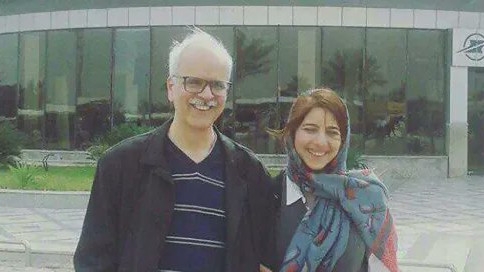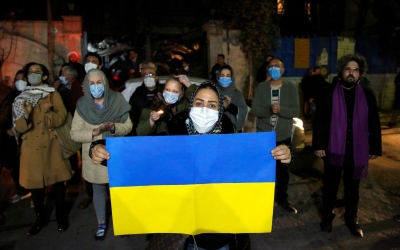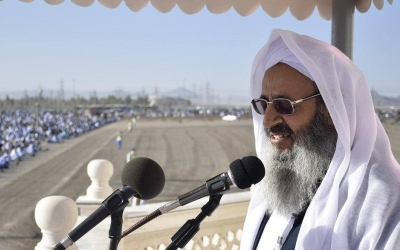Iranian press review: Sociologist imprisoned for nine years for doing sociology

Decade in prison for social researcher
Iran's Islamic Revolutionary Court sentenced Saeed Madani, a social scientist and researcher, to nine years in prison for "propaganda against the establishment" and "organising opposition groups" on Tuesday.
In January, he was banned from leaving the country, and in May, the Islamic Revolutionary Guard Corps (IRGC) arrested him at his home.
Madani's research focused on capital punishment, civil society, social movements, violence against women, addiction and prostitution in Iran. In recent years, authorities have banned him from publishing his books and the results of his studies.
According to The Shargh Daily, his book Against the Death Penalty, published in Sweden, was used by judiciary officials to prove his "acts against national security".
Despite authorities' pressure on Madani, high-ranking security officials have reportedly held meetings with him in prison, asking for his analysis and advice on the protests that have rocked Iran since the death in custody of Mahsa Amini in September.
Madani's lawyer, Mahmoud Behzadirad, told the paper that Intelligence Ministry officials had three meetings with him in the country's notorious Evin prison.
"They asked him about the potential solutions for the growing violence in the country, and Madani responded that the solution is to stop the government's violence and give rights to protestors," Behzadirad was quoted as saying.
Since 2000, Madani has been arrested and imprisoned several times. In 2016 he was exiled to the port city of Bandar Abbas in southern Iran.
Gas shortage paralyses industry
Iran, which has the world's second-largest natural gas reserves, has been suffering a chronic gas shortage in recent weeks.
Authorities have rationed gas usage by the petrochemical industry and cement producers to provide household gas, as a cold snap sweeps the Middle East.
The shortage has been caused by old infrastructure, outdated refineries and higher consumption than the global average.
The Sazandegi Daily wrote that authorities' failure to solve the problem could cost the steel and petrochemicals industries $6bn and $5bn, respectively.
The Ilna news agency reported that the gas shortage had paralysed cement plants across the country, as gas to 50 factories was cut.
Authorities also stopped gas supplies to over 800 governmental and ministry offices, according to the ISNA news agency.
Record number of Iranians leaving annually
The number of Iranians emigrating annually reached a new record high of 66,000 in 2020, according to new statistics.
Bahram Salavati, director of the Iran Migration Observatory, warned on Sunday that most of the emigrants are university graduates and entrepreneurs.
Arman Meli Daily quoted Salavati as saying the emigration of each educated Iranian citizen costs the country's troubled economy $120,000.
Official data shows that over the past two decades, the number of university students leaving the country tripled from 17,000 in 2000 to 66,000 in 2020. Only 16 more countries worldwide have more emigrating university students.
Social and political oppression, the economic crisis and lack of hope for Iran's future are pushing people abroad, the Migration Observatory reported.
The body added that people working in the healthcare system were often interested in emigrating. Iran is already suffering from a considerable lack of doctors and nurses.
In 2018, over 29,000 Iranians worked in the US healthcare system, over 8,000 of them doctors and surgeons, the daily added.
This year, over 142,000 Iranians in the world had asylum seeker status.
Arab countries are China's choice for trade, says Iran's ex-ambassador
Iran's former ambassador to China, Seyyed Mohammad Hossein Malaek, said that China preferred trading with Arab countries in the Gulf to Iran, despite the 25-year economic and military cooperation agreement signed by Tehran and Beijing.
Statements by China's president, Xi Jinping, during a recent visit to Saudi Arabia fueled speculation about the future of relations between Tehran and Beijing. Xi publicly sided with the Arab countries in the territorial and political rivalries between Iran and its neighbours.
"China decided to sign the statements because it reached the conclusion that Iran cannot work with them at a level that they want," Malaek was quoted as saying.
The diplomat added that US sanctions on Iran are hindering further economic ties between the two countries.
"China does not like sanctions and they think that Iran will face more because it cannot solve issues related to the nuclear program," Malaek added.
China has been the leading importer of Iran's oil and petrochemical products since the US began a maximum pressure campaign and tough sanctions on Tehran in 2017.
*Iranian press review is a digest of news reports not independently verified as accurate by Middle East Eye.
Middle East Eye propose une couverture et une analyse indépendantes et incomparables du Moyen-Orient, de l’Afrique du Nord et d’autres régions du monde. Pour en savoir plus sur la reprise de ce contenu et les frais qui s’appliquent, veuillez remplir ce formulaire [en anglais]. Pour en savoir plus sur MEE, cliquez ici [en anglais].







